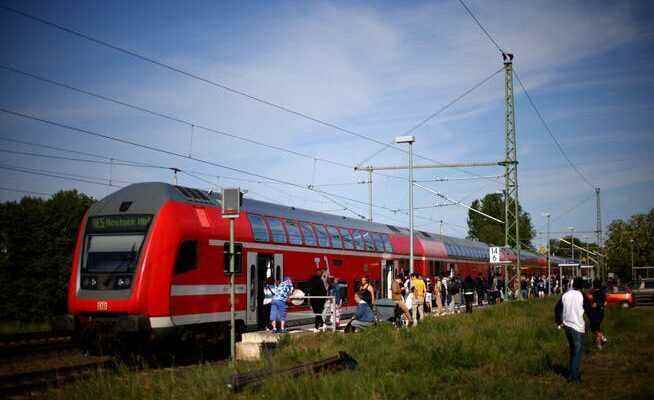Promotions such as the nine-euro ticket are of little use to public transport in the long term. The state has to ensure good infrastructure, but attractive offers are a matter for SBB and the industry.
The nine-euro ticket led to overcrowded trains in Germany.
High energy prices have sparked activism in Parliament. The parties outdo each other with demands to relieve the citizens with the watering can. Germany introduced a nine-euro ticket for the summer. It entitles you to free travel in second class for one month on regional transport – from Lake Constance to Sylt and Rügen. The industry has already sold around 16 million of the dumping price tickets. The Swiss left now wants to jump on the cheap train: In advances, the SP is demanding a public transport campaign to encourage people to change, for example with a day ticket for ten francs and a reduced half-fare subscription.
Public transport must play a greater role if the federal government wants to achieve its climate goals. However, the primary task of the state is to ensure an attractive infrastructure. In international comparison, Switzerland has an excellent rail network with a dense timetable, not only in the centers but also in the periphery. This has its price: The average cost recovery rate in subsidized regional transport is only around 50 percent. Corona hit SBB hard. So hard that the taxpayer has to pay for the billions in losses. Parliament decided this week that the federal government should declare the deficits extraordinary.
It is out of place to demand cheap offers at the same time. They would again tear a hole in the coffers of the industry that the general public has to cover. Moreover, more public transport is not automatically better. Dumping prices should not only encourage drivers to change, but above all lead to additional journeys. Public transport in Switzerland has a good CO2balance and is efficient when transporting large numbers of people over longer distances and in agglomeration traffic. However, the most ecological is still every trip that does not take place at all.
The demands to make public transport free, which keep popping up in red-green strongholds, show how part of the left thinks. Such socialist ideas testify to a short memory. In 2014, the people spoke out clearly in favor of a fund for the railway infrastructure. Part of the proposal was also that the users bear a reasonable part of the costs of public transport.
Politicians can use short-term campaigns like the nine-euro ticket to distinguish themselves. However, they hardly serve public transport in the long term. Peter Füglistaler, Director of the Federal Office of Transport, summed it up in an interview with the “Süddeutsche Zeitung”. “Just cheap is not enough to convince more people of the railways,” he said. The quality must also be right. Especially with Deutsche Bahn, whose delays also affect Switzerland, this is too often not the case. Since the introduction of the nine-euro ticket, reports of overcrowded trains have also increased.
Switzerland does not need a German cheap ticket. It is up to the SBB and the other transport companies to convince them with good offers. For public transport to be successful, it must first and foremost be punctual, convenient and fast. The SBB struggled with delays last autumn, but now have operations better under control. However, there are still too many problems on some lines and in some regions. Attractive tariffs are also indispensable. With supersaver tickets or e-tickets, the SBB are on the right track. But the industry must offer more flexible offers, especially for subscriptions, for example for individual days of the week.
It is more important than symbolic politics to bring the railway, whose image suffered because of Corona, closer to the population again. With the anniversary “175 Years Swiss Railways” the industry seems to succeed. According to the «St. Galler Tagblatt» Tens of thousands of events in Eastern Switzerland. These offered a lot, from a visit to a Stadler Rail factory to trips on historic trains operated by the Appenzeller Bahnen, which lovingly preserved old rolling stock in cooperation with clubs. There was also a cheap day ticket for the journey – without intervention from the Federal Palace.
